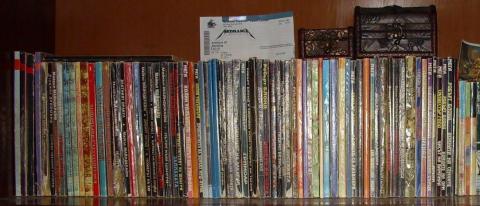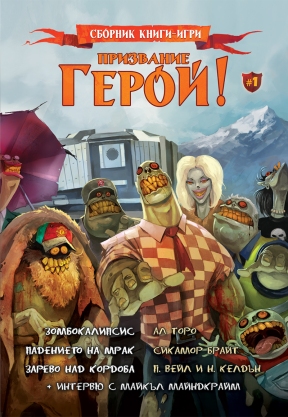Gamebooks in Bulgaria: the Reader as Protagonist
24.01.2013 § 1 Comment
Dear readers, long time no update. Please forgive my absence. I’m restarting regular contributions to this blog with a post I’ve been meaning to put together for a while.
The early to mid-nineties were a strange time in Bulgaria. Many people growing up in those days (like myself) found themselves in a gaming vacuum. Computers and gaming consoles were exceedingly rare, yet we were all well aware of their potential as entertainment devices, and we were desperately searching for something to fill the entertainment void. All that was needed was a fortuitous event and an invention to fill the void.
One day, Lubomir Nikolov (Любомир Николов), an English-Bulgarian translator, stumbled across an English gamebook in a used bookstore. He quickly figured out how to read it, and realized that no one in Bulgaria had seen anything like it.
A gamebook is a piece of interactive fiction in which the reader makes choices that affect the progression of the story. In a sense, the reader is playing the book as a game, being rewarded for good choices and punished for bad ones. Gamebooks are often written in the first or second person, contributing to the illusion that the reader is in fact the main character of the book.
Theoretically proposed in the 1940’s, the first experiments with interactive books were proposed for teacherless textbooks in the 50’s. Interactive fiction did not emerge until the 1970’s and peaked in the English-speaking world in the mid-80’s with series such as Choose Your Own Adventure, Bloodsword and Fighting Fantasy.
By the time Nikolov stumbled across a gamebook in a musty shop in Sofia in 1991, the genre had long passed its apogee in the West, but was virtually unheard of behind the Iron Curtain. As luck would have it, apart from being a translator, Nikolov was also an avid fantasy fan and a writer. When he read the Lord of the Rings trilogy in the mid-80’s, he was offered the task of creating its first translation in Bulgarian, which he undertook with vigour. After three years of work, the trilogy was complete, and Nikolov had become a Tolkien specialist who would go on to translate The Hobbit and The Silmarilion, as well as books by John Grisham, Ernest Hemingway, Stephen King, Clifford Simak and Frank Herbert.
Inspired by this new form of writing, Nikolov penned the first Bulgarian gamebook, “In the Labyrinth of Time” (“В лабиринта на времето”). Another of his gamebooks, titled “Desert of Fire” (“Огнена пустиня”), was actually published first with Nikolov’s real name on the cover. By 1992, “The Castle of the Talasams” (“Замъкът на таласъмите”) and “In the Labyrinth of Time” had followed, and young readers were starting to take notice.
Due to a quirk of the Bulgarian book market at the time, which was starved for Western content, Nikolov chose an English penname: Colin Wallumbury (Колин Уолъмбъри), and would release most of his 30 gamebooks under that name. By 1995, over 40 original Bulgarian gamebooks had been published, mostly by Pleiada publishing house, and an entire generation of aspiring writers had become household names. These names included childhood friends Robert Blond and Adrian Wayne (pennames of Bodgan Rusev and Alexander Sultanov), Michael Mindcrime (Dimitar Dafovski), George M. George (Georgi Mindizov) and the only female writer in the pantheon, Elena Pavlova, who wrote under the male penname Virgil Dreamond. Robert Blond, by the way, would later become the translator of the Lord of the Rings film trilogy.
The genre was on fire. Kids of all ages were saving their hard-earned pocket money and buying gamebooks, often with the support of their parents who were happy to see them reading. Some gamebooks were translated Western titles (such as the Bloodsword series), but the vast majority were original Bulgarian works. Settings ranged from high fantasy, through sci-fi, contemporary, Western, to historical and humorous. Gamebook systems were becoming more elaborate, approaching roleplaying games in their complexity. Characters had hit points, there were dice-based combat rules, and authors were experimenting with tactical maps and code words. At the same time, authors tried to keep choices honourable as well as prudent, rewarding altruistic behaviour in-game and refraining from tremendous amounts of gore or adult content.
Between 1994 and 1999 a gamebook magazine was also published with some regularity, offering authors a chance to experiment with shorter story lines and periodical instalments.
After developing a huge fan base and churning out close to 300 titles, the genre abruptly fizzled out at the turn of the millennium. This was due to a combination of factors – an economic recession and rising costs of publishing, many of the authors leaving the genre to pursue other projects, and the proliferation of household PC’s which offered faster and flashier gratification to the new generation of gamers. The pages of the paperbacks that had entertained a generation for close to a decade began to yellow, hidden away in boxes or on bookshelves in our childhood rooms, and we grew up, supposedly. However, the love for the genre smouldered on, fuelled by the nostalgia of the 90’s generation and the occasional re-readings of a dog-eared favourite.
Its rekindling would come over a decade later. A small contingent of faithful fans created an online gamebook community in 2010, which began speculating about a revival of the genre. The time seemed ripe – the children of the ’90s had grown up and were becoming disillusioned with the oversaturated video game market, which sometimes favours graphics over storyline or engagement. The release of the first new gamebook in a decade, “The Tomcat and the Black Narcissus” (“Котаракът и черния нарцис”) by new author Al Toro (Alexander Torofiev), followed swiftly by an online magazine, has started a revival of the genre. More books are being planned, and three more have already been released, including “The Assassins of Persia” (“Асасините на Персия”) by the classic duo Blond & Wayne and an updated version of “Patrol to Hell”.
The newest entry on the market, entitled “Vocation: Hero” (“Призвание: Герой”), is a compilation of three short gamebook stories that only came out in December of 2012. The first, written by Al Toro, is called “Zombiepocalypse” and is, naturally, zombie-themed. The second, entitled “Glow over Cordoba” (“Зарево над Кордоба”), is part of a series on 13-th century Andalusia by Peter Vale and Nol Keldon, and the last one, by Sycamore Bright (Yavor Yalachkov), is called “The Fall of Darkness” (“Падението на Мрак”).
I have a soft spot for this last book, since it represents the realization of a childhood dream for me, as one of those stories was actually written by me. When we sensed that the genre was reviving, my cousin I. (infamous from our treks through the Balkans and Rila) and I sat down and devised an entire series of historically themed gamebook storylines, which we then set out to write. We published the first in the online gamebook magazine, and we were contacted by Al Toro to include the second in his compilation. I chose the name Peter Vale as a reversal of my initials (VP), and my cousin claimed Nol Keldon as a tribute to his father.






Zdraveite tolkova se radvam che namerih nai-setne informaciq za liubimite mi knigi igri. Tursih v google za tezi imena i taka i ne gi otkrivah. Zashtoto sa si bili bulgari! Neveroqtno! Kakvo li ne bih dala da moga pak da gi procheta i da gi si gi kupq. Sega jiveq v Kanada. Mojete li da mi pomognete s informaciq kude moga pak da namerq tezi knijki!! Blagodarq vi ot surce!
Nadia-3d artist 😀